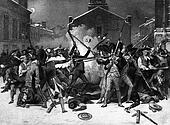 "They (the Jews of St. Eustatius, Caribbean Antilles) cannot too soon be taken care of - they are notorious in the cause of America and France."
"They (the Jews of St. Eustatius, Caribbean Antilles) cannot too soon be taken care of - they are notorious in the cause of America and France." Admiral Sir George Rodney commander of the British Fleet, February, 1781.
The Colonial American Jewish experience 1654 - 1770 was characterized by sharp departures from historic European anti-Semitic patterns of isolation, social, economic, physical, legislative and religious discrimination. The American Colonial world was growing, changing and evolving so rapidly it did not have time to focus on historical Jewish scapegoat-ism. The demands of the frontier and the expanding new American economic power needed the best of all of its people.
Jews in Colonial America struggled and won rights that were inconceivable and nonexistent in Europe. Jews struggled for and won the rights to equal economic opportunity, to own land, to go to higher secular education, to serve in the armed militias, to vote and in some colonies to become members of the legislative bodies. In some colonies the struggle was easy, in others it was very hard.
The American experience was not an automatic entitlement to toleration and sufferance, rather the pre-revolutionary experience was one that permitted the old discriminations to be challenged and eventually to be put aside. Hatred of the Jew and imported anti-Semitism did exist but it could not flourish in the melting pot of common need and survival.
 Patrick Henry, the revolutionary war governor of Virginia, rose in assembly and made his famous "Give me Liberty or Give me Death," speech. He did so with the belief in liberty for all except for Jews, Blacks and Indians.
Patrick Henry, the revolutionary war governor of Virginia, rose in assembly and made his famous "Give me Liberty or Give me Death," speech. He did so with the belief in liberty for all except for Jews, Blacks and Indians.Jews traced their earliest participation in Virginia's life from the 16th century with Sir Walter Raleigh through Jamestown and the revolution. The first permanent synagogue community Kehilah ha Kadosh Beth Shalome, was founded in 1789 in Richmond, Va.. Beth Shalome built its first permanent building in 1820 in Richmond. The president of the congregation at the time of dedication was Jacob Mordecai, born in 1762 in Philadelphia. His mother Elizabeth (Esther) Whitlock had been a Christian convert to Judaism.
Who could do the best became more important than who was who's parentage in Colonial America. It was not until many years later that who were your parents and where did they come from became more important than what can you do to better yourself, your community and your country.
In 1753, the British Parliament, to legitimize and encourage economic development both in the colonies and in the mother country passed a Jewish Naturalization Bill. The purpose simply enough was to grant limited rights, such as land ownership, to foreign born Jews who wished to become British subjects. The bill had the opposite effect in England stirring intense violent anti-Semitic feeling and prejudices. The bill was repealed by Parliament in 1760. In Colonial America the legislation was generally ignored or circumspectly treated.
For almost a hundred years, if one colony refused to grant citizenship to a Jew the expedient thing was to go to another colony that would grant it or more simply ignore the issues of Naturalization entirely as most immigrants did. For the most part the tiny Jewish community was not affected by the machinations of the mother country's bigotry. Jews were generally free to develop economically, participate in colonial life and practice their faith.
Political equality was not a universal right but an evolving right in colonial America. Yet it left a lasting impression on Jews before the Revolution that the old world, if given the opportunity, would try to transfer it's bigotry to the new world. The repeal of the Naturalization act placed an awareness in the minds of much of colonial Jewry that America was different from Europe. It was the commonality of the challenge of America that was to shape American views and identity.
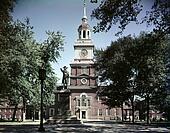 The colonies were different from each other, the North from the South, or the West. The British struggled to impose a central government on a frontier world that was rapidly developing far away from London. For the Jew, the Colonial experience was different in that there was no fully established homogenous world that they encountered. Rather they encountered a world that was being established and was not fully formed or mature. It was not until many years later, as the American frontier officially closed, (1890), that Nativism and the weak seeds of anti-Semitism would grow as Americans searched for identity.
The colonies were different from each other, the North from the South, or the West. The British struggled to impose a central government on a frontier world that was rapidly developing far away from London. For the Jew, the Colonial experience was different in that there was no fully established homogenous world that they encountered. Rather they encountered a world that was being established and was not fully formed or mature. It was not until many years later, as the American frontier officially closed, (1890), that Nativism and the weak seeds of anti-Semitism would grow as Americans searched for identity. The Jews tended to settle wherever doors were open; most frequently in the urban environments but also in rural and frontier areas. Jews did not come seeking freedom of religion as much as freedom of opportunity. Traditional Judaism weakened in the face of American freedom of choice only to be reborn later with an American voice.
The American Revolution, 1776-1783, did not start out intentionally as a revolution. The Colonial American world was an evolving, growing English world that demanded fair representation from the British Parliament. The British government saw the Americas as a source of money, power and natural resources to be delivered and ruled unquestioningly by the mother country.
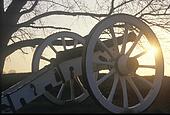 The British government failed to realize that the Colonials saw themselves as British Americans with the right to a voice in their affairs, to influence their laws, their economy their frontiers and their taxation. The Revolutionary war was to be the longest war in American history prior to Vietnam. It was fought over a one thousand five hundred mile front on the developed farmlands of thirteen colonies, on the sea and on the frontier. Oct. 25. 1765, a group of Philadelphia merchants gathered in the State House to sign the non-importation agreement to fight the hated Stamp Tax of the British government. The first man to step forward to sign his name was the president of Mikve Israel Congregation, Philadelphia's only synagogue, Mathias Bush.
The British government failed to realize that the Colonials saw themselves as British Americans with the right to a voice in their affairs, to influence their laws, their economy their frontiers and their taxation. The Revolutionary war was to be the longest war in American history prior to Vietnam. It was fought over a one thousand five hundred mile front on the developed farmlands of thirteen colonies, on the sea and on the frontier. Oct. 25. 1765, a group of Philadelphia merchants gathered in the State House to sign the non-importation agreement to fight the hated Stamp Tax of the British government. The first man to step forward to sign his name was the president of Mikve Israel Congregation, Philadelphia's only synagogue, Mathias Bush. As the tensions between Britain and the American Colonies increased and finally erupted into war the American Colonial population was split almost into thirds; one third supported the war, one third was neutral and one third was pro British. The small Jewish population of America was also divided – the choice though was very heavily and disproportionaly in favor and support of the American Revolution. Not only did the Jews pledge their fortunes and sacred honor for America but their very lives.
Compromise between Britain and its colonies could not be reached. The British blockaded Boston and sent an occupying army to take the city. The call to arms rang throughout the countryside. Volunteers rushed to defend the city at the Battle of Bunker Hill, June 17, 1776. The famous order of the American commander during the battle was "do not fire until you see the whites of their (the advancing British Regular's) eyes."
In the front ranks of the smoke and fire of battle was Aaron Solomon standing shoulder to shoulder with his Christian comrades of the Gloucester volunteers. Eight hundred miles to the South the British were stirring up the Cherokee Indians to attack and kill settlers on the South Carolina/Georgia frontiers.
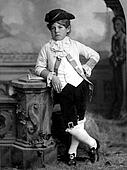 Francis Salvador, a Jew of Sephardic heritage, the first Jew to be elected to a Colonial constituent assembly rode out to carry the alarm and raise the volunteers to repel the impending Indians attacks. He returned at the head of a force of frontiersmen only to be ambushed, shot down and scalped, July 1, 1776. Salvador had the dubious honor of being the first American Jew to give his life for his adopted country.
Francis Salvador, a Jew of Sephardic heritage, the first Jew to be elected to a Colonial constituent assembly rode out to carry the alarm and raise the volunteers to repel the impending Indians attacks. He returned at the head of a force of frontiersmen only to be ambushed, shot down and scalped, July 1, 1776. Salvador had the dubious honor of being the first American Jew to give his life for his adopted country. A few days later in Philadelphia, July 4, 1776, the Declaration of Independence was written. A copy was sent to Amsterdam via the small Dutch Caribbean Island of St. Eustatius. The Declaration was intercepted by the British at sea. An accompanying letter with the Declaration of Independence was also intercepted and sent to London as being a secret code about the document that needed to be deciphered - the letter was written in Yiddish.
The war was not going well at first for the young American army. Though facing hard times and even defeat, Jews stood and fought along with their neighbors. Into the terrible dark cold winter at Valley Forge, Abraham Levy and Phillip Russell stood their watch. Joseph Simon from his frontier forge at Lancaster, Pa. supplied the Army with the famous Henry Rifles. Jewish trading merchants, peaceful before the war, outfitted their ships to become privateers and ravage the British at sea. The cost to many was great, the great merchant traders of Newport, Rhode Island saw their fortunes lost.
 Men such as Aaron Lopez were bankrupted supporting the Revolution when their ships were lost to the British. In the area of finance the young American government might have foundered too except for the financial genius and personal financial risk and support taken on by Hayim Solomon. Solomon was to die bankrupted by his total support of the American cause. Though small in number the Jews chose to caste their fate with America.
Men such as Aaron Lopez were bankrupted supporting the Revolution when their ships were lost to the British. In the area of finance the young American government might have foundered too except for the financial genius and personal financial risk and support taken on by Hayim Solomon. Solomon was to die bankrupted by his total support of the American cause. Though small in number the Jews chose to caste their fate with America. But how did the Jews save the American Revolution? As late as 1781 the war had not been won by the Americans nor was it lost by the British. Arms were being funneled into the Colonies by arms merchants running the British blockade primarily from the tiny free trading Island of Dutch St. Eustatius. Jewish merchants and arms traders were a major presence on the island.
In 1781, the British realized they had to cut off the open door of arms shipments to the rebels through St. Eustatius. Admiral Sir George Rodney was sent to capture the island. His goal was to destroy the supplies and destroy the island's commercial and merchant class so they could not provide any more aide to the rebels. Early in 1781 the lightly defended island fell to the heavy presence of the main British battle fleet. Rodney in his vehemence destroyed the warehouses and the supplies. He burnt every home. He paid particular venomous attention to the Jews of St. Eustatius. The British burnt their homes and the synagogue, Honen Dalim, "She Who is Charitable to the Poor" – built 1739. Jewish property was confiscated and the men imprisoned with particular cruelty. Rodney spent months directing half his fleet to convey much of the stolen treasure back to England.
While Rodney was engaged in St. Eustatius, Lord Cornwallis and his army of British regulars were forced out of the Carolinas and retreated to the small port of Yorktown, Virginia on the James Peninsula. He needed to await critical reprovisioning and fresh reinforcements being brought by the British fleet. The weakened British fleet, with Cornwallis's reinforcements, was intercepted at sea by the French fleet under Admiral DeGrasse and soundly defeated. Degrasse took up positions at the mouth of the Chesapeake Bay blockading Yorktown from the Sea.
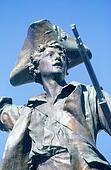 General George Washington saw his chance. Washington trapped and besieged Cornwallis. In short course Cornwallis surrendered. The war was over. The Americans had won with the help of the French.
General George Washington saw his chance. Washington trapped and besieged Cornwallis. In short course Cornwallis surrendered. The war was over. The Americans had won with the help of the French. But how did the Jews save the American Revolution? If the Jews had not helped turn St. Eustatius into a major arms center for the Revolution and if Admiral Rodney had not spent so much time destroying St. Eustatius and particularly the Jews, the war might have ended differently. There is little doubt that Admiral Rodney's anti-Semitism helped squander his time and played a role in delaying and weakening the British fleet. Ironically it was the Jews of St. Eustatius who helped win the American Revolution.
Jerry Klinger, the author of this piece, is President of the Jewish American Society for Historic Preservation: http://www.jashp.org/



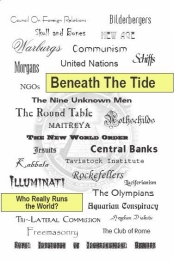


_(english).jpg) It is perhaps the most instantly identifiable mark of a Jew.
It is perhaps the most instantly identifiable mark of a Jew.

No comments:
Post a Comment